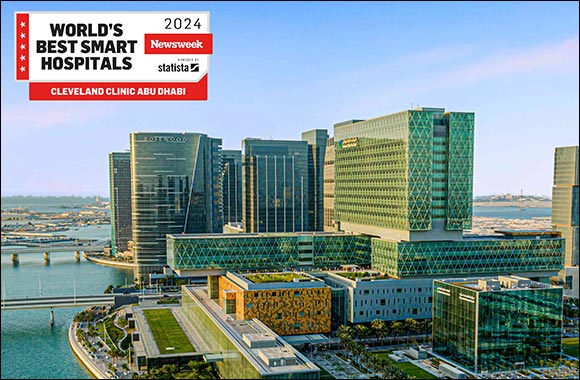• Cleveland Clinic Abu Dhabi ranked amongst the top smart hospitals in the world on Newsweek’s 2024 ‘World’s Best Smart Hospitals’ rankings
• Listed among 330 renowned hospitals from around the world, this recognition is based on the adoption of smart technologies that are leading personalized, precision patient care
Abu Dhabi, United Arab Emirates. November 17, 2023: Cleveland Clinic Abu Dhabi, part of the M42 network, has been ranked as the top hospital in the UAE and Gulf region for the second time by Newsweek in its ‘World’s Best Smart Hospitals’ 2024 list. The ranking places the hospital amongst the top in a list of 330 world-class healthcare facilities from across the globe.
The 330 global hospitals part of the list from 28 countries were assessed on the smart technologies that are available at these facilities. The key areas of analysis included electronic functionalities, telemedicine, digital imaging, artificial intelligence (AI), and robotics.
Expressing his delight over the recognition, Dr. Jorge Guzman, Chief Executive Officer of Cleveland Clinic Abu Dhabi, said: “Technology is one of the cornerstones of the advanced patient-centric care that we provide to the community in the UAE and wider region. More efficient, targeted and personalized care is underpinned by the medical and technological breakthroughs that are revolutionizing the healthcare sector. Artificial intelligence-enabled tools with deep machine learning techniques are particularly helping us analyze vast amounts of data and predict trends and patterns that aim to better patient outcomes. This is evident in the provision of state-of-the-art technologies such as adaptive radiation therapy with unprecedented accuracy in treatments, cutting-edge robotic and non-invasive surgeries, seamless and secure electronic health records management, high-resolution digital imaging, and automated telemedicine solutions.”
Among several disruptive medical technologies available at Cleveland Clinic Abu Dhabi is the ARTIS Icono, an advanced stroke intervention system that uses artificial intelligence to power 2D and 3D imaging for patients. Given the hospital’s expertise and multidisciplinary approach to care, Cleveland Clinic Abu Dhabi was recently designated as a Centre of Excellence for both stroke care and adult cardiac surgery by the Department of Health – Abu Dhabi.
The hospital’s Fatima bint Mubarak Center opened earlier this year, employs the Ethos adaptive radiotherapy, a treatment technology that employs AI and machine learning to adapt cancer patients’ treatment in real time. It is also home to a chemotherapy robot, which leverages an automated compounding process to prepare patient-specific hazardous doses with ease and accuracy and ensure improved patient and operator safety.
Advanced imaging techniques form the backbone of providing the best care to patients. Therefore, the hospital has introduced some of the most sophisticated imaging options such as Speckle-Tracking Echocardiography (STE) that analyzes the motion of tissues in the heart, helping to detect subtle myocardial dysfunction and 3D mapping systems which use multiple catheters and advanced software to capture electrical information from the heart and convert it into detailed 3D models that help visualize complex arrhythmic circuits and target them accurately.
Adoption of predictive modeling approaches and AI has also influenced communication between various teams at Cleveland Clinic Abu Dhabi, enhancing patient engagement. For convenience and accessibility, patients can access healthcare services, information, and resources at their fingertips through the hospital’s smart Patient Portal app that continuously evolves.
A testimony to Cleveland Clinic Abu Dhabi’s drive for adopting the most advanced diagnosis and treatment options is also its long list of successful patient case studies. Recently, the hospital’s Neurological Institute used an auditory brainstem implant, a surgically implanted device that provides a sensation of sound to a person who has severe hearing loss due to damage to the auditory nerve, to restore genetically induced hearing loss for a young patient with multiple large benign intracranial tumors. Another example is its introduction of a comprehensive Invasive Microvascular and Coronary Spasm Program testing in the UAE, which has helped numerous patients by evaluating for a hard-to-detect cardiac disorder that causes angina (chest pain) because the arteries supplying blood to the heart have either spasmed down or have failed to dilate adequately.



